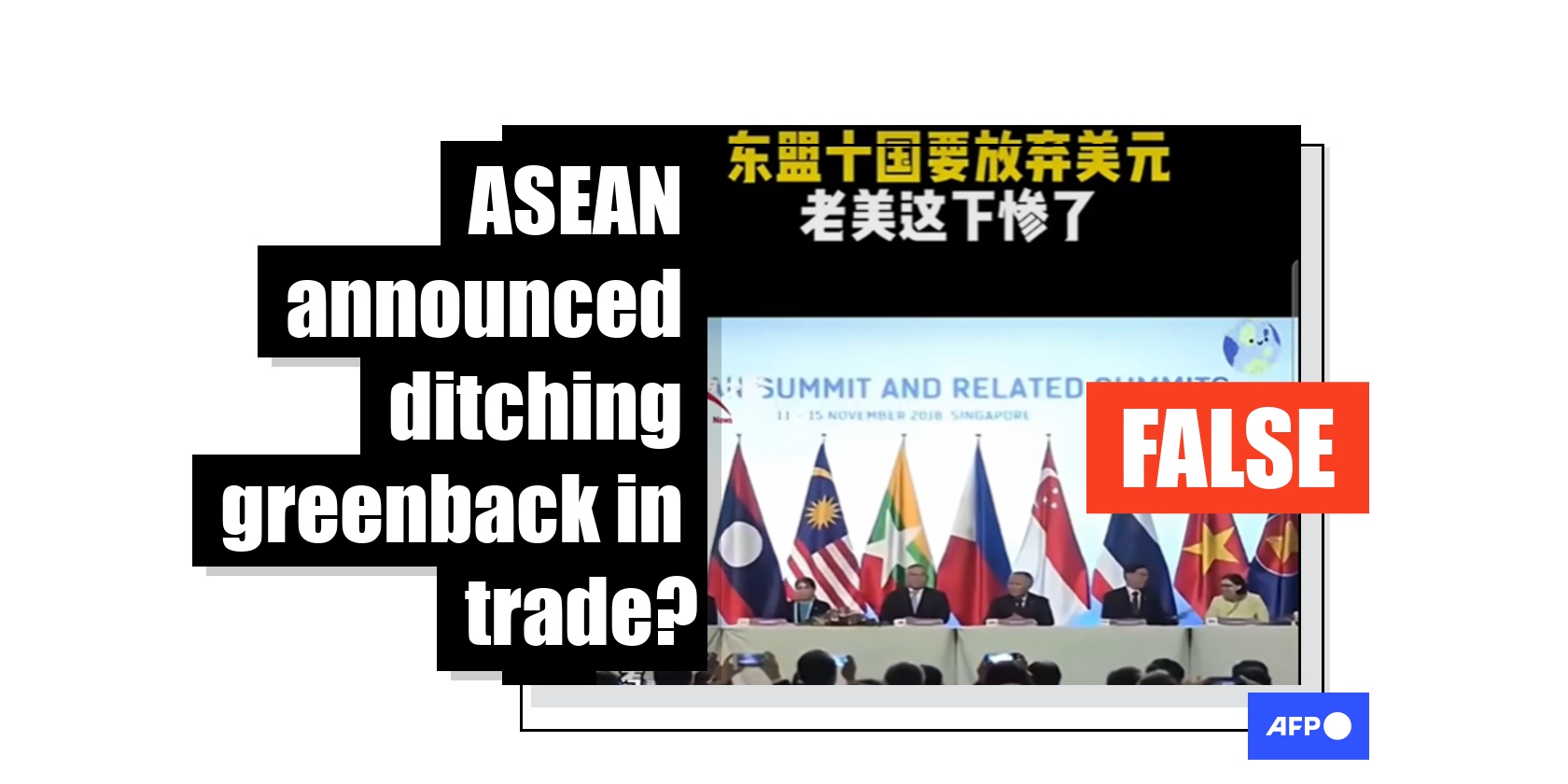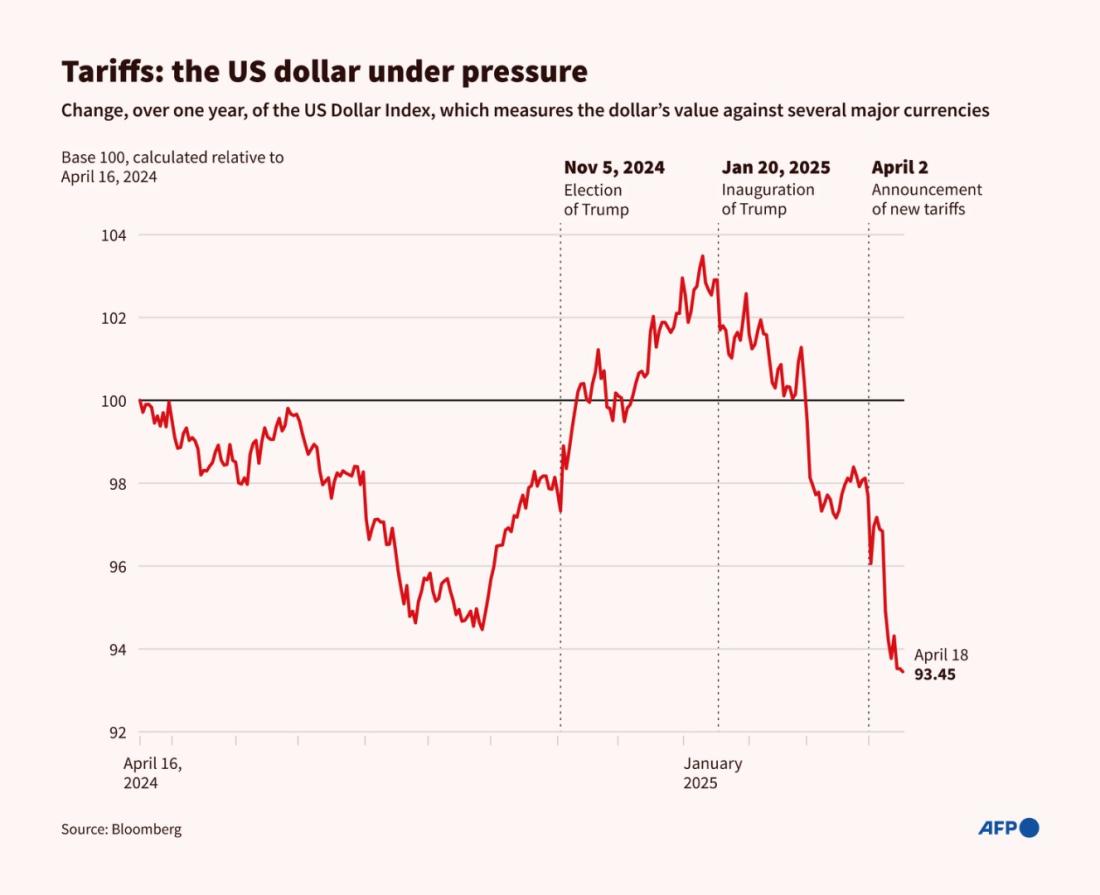
Southeast Asian regional bloc did not say it's 'giving up dollars'
- Published on October 9, 2025 at 08:33
- 3 min read
- By Anne CHAN, AFP Hong Kong
"Ten ASEAN member states are giving up US dollars," reads simplified Chinese text superimposed on a Facebook video shared September 29, 2025.
The Mandarin narration claims that ASEAN issued a joint statement after a meeting that "nine countries, including Malaysia, Vietnam, and Cambodia, reached a consensus to abandon the US dollar."
It went on to say that despite opposition from the Philippines, Manila still had to follow the vast majority, adopt domestic currencies for transactions and drop the greenback.
The video comprises similar footage of an ASEAN summit in Singapore in November 2018 and a US-ASEAN Special Summit in Washington in May 2022 (archived link).
It also includes a clip showing the signing ceremony of the Regional Comprehensive Economic Partnership -- a free trade agreement among 15 countries -- on November 15, 2020.

The claim spread elsewhere on Facebook, Douyin, RedNote and TikTok as early as August, after US President Donald Trump unveiled revised reduced tariff rates for Southeast Asian countries (archived link).
Trump has imposed tariffs of between 10 and 40 percent on ASEAN member states, with Laos and Myanmar facing the highest rate, while Singapore faced a baseline 10 percent levy (archived link).
Prior to that, in April, Trump announced tariffs as high as 49 percent on other members of the regional bloc, particularly Cambodia (archived link).
On May 26, 2025, ASEAN launched a plan that aims to promote the use of local currencies in trade, which analysts said is a move to shift away from the greenback (archived here and here).
But there had been no official statement declaring ASEAN "will stop using the US dollar," the ASEAN Secretariat in Jakarta told AFP on October 9.
'Key currency'
Eric Robertsen -- Standard Chartered's Global Head of Research and Chief Strategist -- said the global dominance of greenback remains largely unchallenged (archived link).
"USD continues to be a key currency in global trade, particularly for ASEAN countries," he told AFP via an email on October 1.
"ASEAN companies predominantly hold their export receivables in US dollar, underscoring its critical role. While there is some movement towards diversifying into the Chinese Yuan to balance trade receivables, this is a complementary strategy rather than a shift away from the US dollar."
Natixis' Asia-Pacific chief economist, Alicia García-Herrero, agreed, saying it is untrue that ASEAN countries are dumping the greenback (archived link).
"But of course, given what's happening with Trump and the US economy, the lack of credibility is clear and this process will eventually take place. But I wouldn't think that this is happening already," she told AFP via WhatsApp on September 23.
Still using dollars
Stock exchanges in countries such as Cambodia, Malaysia and the Philippines still allow settlement in dollars (archived here, here and here).
Malaysian Prime Minister Anwar Ibrahim in July told a business forum that Malaysia has not dropped the dollar even as the region promotes the use of local currencies.
"We are not talking about de-dollarisation because there's a long way to go. But at least we try. Malaysia with Indonesia, Malaysia with Thailand, and together with China, are trying to use our local currencies. Even if it begins with 10 percent or 20 percent, it makes a difference," Anwar said at the BRICS Business Forum in Brazil (archived link).
The Hong Kong Business Association of Cambodia also said they had not received any order to stop using the dollar for trades (archived link).
"We are using local currency (Riel) for tax settlement. However, for all other transactions, including overseas settlement, we are still using USD, with some traders also accepting (the Chinese) renminbi," its spokesperson told AFP in an October 3 email.

While the dollar's status as the global reserve currency appears unshakeable in the near future, many currency experts expect the greenback to continue to weaken in the coming years, given expectations for slower growth after a long run of US out-performance (archived link).
On the other hand, China -- a key trade partner for Southeast Asian nations -- has been pushing the yuan as an alternative medium for payments as officials warn the global monetary system could be "weaponised" and politicised by dominant countries (archived link).
AFP has previously debunked another false claim that Southeast Asian countries will stop using the US dollar.
Copyright © AFP 2017-2026. Any commercial use of this content requires a subscription. Click here to find out more.
Is there content that you would like AFP to fact-check? Get in touch.
Contact us
